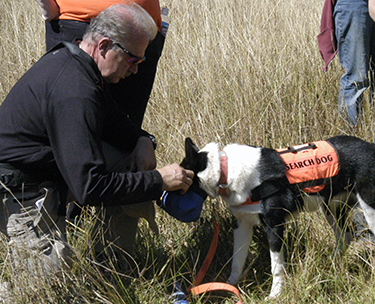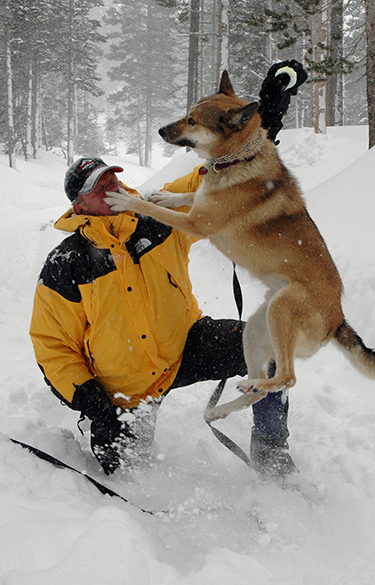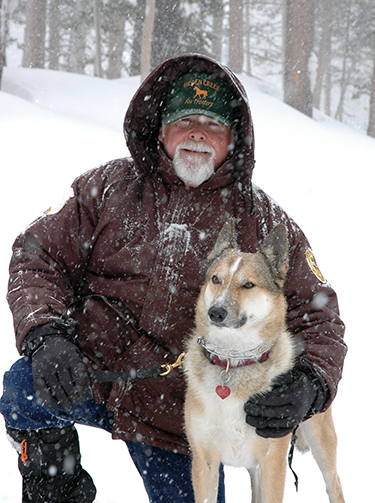Summer travel
In the summer, if you will be away from the car for any length of time and outside temperatures are expected to exceed even 75 degrees, we urge you to consider carefully whether to travel with your Karelian. While we may have only the best of intentions and plan to be away from our cars for only a few quick minutes, even a short distraction can end in tragedy.
Beware the panting dog
A dog may generally tolerate a dietary deficiency in food, protein, vitamins or minerals for several days or even weeks before performance or health are adversely affected. Howevber, dehydration may lead to immediately diminished performance and, in severe cases, to death within hours of onset.
Exercise is a key factor in casing increased water loss. Evaporation occurs through the mouth and respiratory tract. Exercise intensity and environmental temperature and humidity play a factor in how quickly water is lost.

Dogs pant to cool off, rather than sweat, and can lose 6% of their body weight before motivated to drink.
The need to drink can therefore occur well before the desire to drink, causing a rise in body temperature, reduced cardio output and diminished blood flow. (These same consequences occur in humans, which is why we humans have been advised to drink BEFORE feeling thirsty and to drink 8 cups of water a day to prevent dehydration).
In preparing for physical or otherwise stressful activities, preventing dehydration requires two things:
 Anticipating the dog's needs Anticipating the dog's needs
Like humans, dogs need to drink both BEFORE and DURING exercise. Animal health professionals recommend about 1/2 a liter for every 100 pounds of body weight 20-30 minutes before exercise, assuming short intense sprint activities. Frequent water breaks should also be planned, based on the level of exersion.
 Making the water attractive enough so the dog will want to drink Making the water attractive enough so the dog will want to drink
Flavoring the water can make it more palatable. We add a stock cube to a 1-quart bottle of unflavored Pedialyte, an electrolyte drink recommended for human children. (Adding the cube in a little Pedialyte that has been heated helps the cube to dissolve).
|
Winter travel

Our preparedness list:
 Extra protection for head, legs and feet. Extra protection for head, legs and feet.
 Wool blankets in addition to clothing that is adequate for rain, cold and wind Wool blankets in addition to clothing that is adequate for rain, cold and wind
 Advanced first aid kit Advanced first aid kit
 Flameless fire cooking products, food and protein bars, and always, lots of water Flameless fire cooking products, food and protein bars, and always, lots of water
 Portable folding shovel for snow, emergency shelters, a bivouc bag, storm proof matches, and beacons Portable folding shovel for snow, emergency shelters, a bivouc bag, storm proof matches, and beacons
 For the dogs, reflective collars and brass bells (in case you get separated, the bells can enable you to hear the dogs even if you can't see them) For the dogs, reflective collars and brass bells (in case you get separated, the bells can enable you to hear the dogs even if you can't see them)
As you can see, safe winter travel requires some advance planning. To help prevent heat loss, we recommend kennels for transport that are enclosed. Consider using blankets for the animal inside the kennel, underneath the kennel, and on top of the kennel for extra warmth. Bringing along at least one highly absorbant towel is also a good safety precaution, in case your dog gets wet. These items carry easily in a medium size duffel bag for easy handling and storage if you even suspect that the weather may turn cold unexpectedly. Before starting out, learn how to recognize frost bite by consulting a first aid manual or asking your vet.
Even if your dog is acclimated to a northern climate, snow slides, highway closures or car problems can unexpectedly lengthen your trip. Carrying extra food and fresh water is a safety must for both you and your dog. Bringing an anti-diarrheal medication for your dog can also make the trip more pleasant, just in case.
For working dogs who will be expending extra energy, the morning meal should be lighter than the evening meal. Adding hot broth to each meal is also a good tip. You may also want to consider supplementing the dog's normal diet with higher calorie foods. Nutri-Cal, for example is a high calorie, palatable dietary supplement available on line
at petvetdirect.com. Because adequate hydration is also important, you may want to research some of the electrolyte supplements now formulated for dogs.
As you plan the trip, make sure you and your dog are given adequate time to acclimate to large shifts in temperature and elevation. We hope all your trips will be enjoyable and safe for all.

|